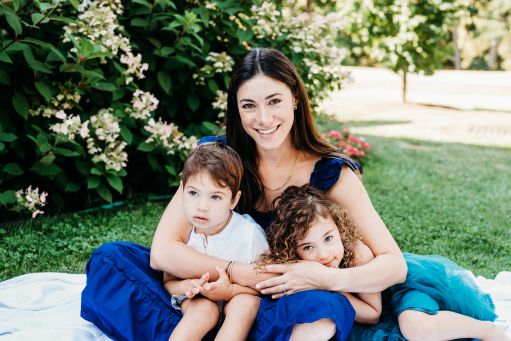
From Founder to CEO: CBS Alum Gabby Slome Shares Her Entrepreneurship Journey
‘For me, it’s definitely about finding my inspiration through things like personal pain points.’
Nina Tandon ’12 talks about the origin of EpiBone and overcoming the challenges facing women entrepreneurs.

While working on her PhD in biomedical engineering at Columbia, Nina Tandon ’12 realized that the cell growth technology she was investigating had immediate applications for medical patients. But success in a lab doesn’t necessarily translate into success for a business. For that, Tandon would need an extra skill set, one she acquired across campus: adding an MBA from Columbia Business School to her accomplishments.
Today, Tandon’s company, EpiBone, uses a patient’s own stem cells to grow new bone, replacing bone damaged by an injury, an illness, or a congenital condition. Tandon recently shared her learnings on launching and growing a strong company.
Nina Tandon: EpiBone is a biotechnology company that grows personalized, living bone and cartilage grafts using stem cells and 3D design. Due to traumatic injuries or congenital abnormalities, some skeletal defects can exceed the body’s natural capacity to heal itself. Using proprietary technology, we grow personalized grafts that promote tissue regeneration and restore function.
Tandon: My co-founder and I were doing our PhD together, and we realized the technology could really work in people. I didn’t want to be a founder, but we both felt someone had to do it. Seeing the cells up close in the lab and realizing their potency really inspired me that cells could be medicine.
Tandon: At a startup, there are significant transitory points at which the culture changes. Going from three people to 10 to 25 — those were very different inflection points for us. Leading our people and hiring our people was very important at an early stage, because if you don’t instill the culture at the bedrock, it will continue to dilute.
The same goes for where we are at in terms of success. A pre-clinical company is a wildly different animal than a clinical-stage company, so we needed to have a flourishing corporate culture in order to make that transition smoothly.
Tandon: You can’t overstate the need to over-communicate your next steps and expectations. In a changing environment, people are looking for safety and security. It’s incumbent upon the senior leadership to provide that direction with clarity.
We made a commitment to not cut any jobs when COVID started. While we were shut down, we shifted everyone to documentation. We then took a long look at our business practices to decide which ones were most at risk to COVID. We had to get really creative and invest more in togetherness.
I think that coaching is our secret sauce, too. We invest in our people. It’s a mentorship model from the top down. That’s helped us change our business practices as we’ve faced new challenges.
Tandon: One of the things that I love about Columbia is that they don’t only have a great engineering school, but they also have a great business school and a great law school, etc. Across campus, you have resources that tie all these various pieces together.
As academic institutions become more of an engine for entrepreneurship, they have an important role both inside and outside the classroom. It was Entrepreneurs in Residence [now the Lang Coach Office Hours] and our business school professors who funded our company. The network of people and the loyalties to the alma mater have been how we’ve raised a lot of money. These kinds of resources we found through Columbia both tangibly and intangibly helped lay the fundamental groundwork for EpiBone.
Tandon: [The majority] of VCs have no female decision-makers. That tees us up for a very difficult headwind to sail through that our male counterparts don’t have to face. The way we change that equation is to get more women in VC. We need to start more female funds so that more women will fund and champion female-founded companies. For female entrepreneurs, we have to not be afraid to enter the industry and do our part to foster a better ecosystem for other women.
Tandon: You will always feel like an imposter, so get used to it. Imposter syndrome is real. That feeling will never go away, because it’s a sign that your dreams are big. If you get a seat at the table, don’t you dare give it away. If you end up at the table, you deserved to be there.
Tandon: Persistence is far more important than motivation. Motivation is fleeting and comes just as easily as it goes, and when it [goes], there had better be persistence in its place. Having the fortitude to stay the course can make the difference between success and failure.
Read more articles in this series:
A Tech Entrepreneur Shaping a Truly Circular Economy

‘For me, it’s definitely about finding my inspiration through things like personal pain points.’

Carolyn Butler ’18 talks about creating a blueprint for the first truly circular business model in the US apparel industry.

Kelly Ifill ’17 chats about career pivots, community, and her commitment to supporting Black and brown entrepreneurs.

These dynamic entrepreneurs discuss the tech businesses they’ve launched, navigating COVID, and ways women founders can prevail over their unique obstacles.
The COVID-19 pandemic has changed the world of business, while bringing historical inequities and injustice into sharp relief.
Subscribe to Leading Through Change to receive the latest insights from Columbia Business School to help you navigate this unprecedented time.
There was an error, please try again.
Go Back